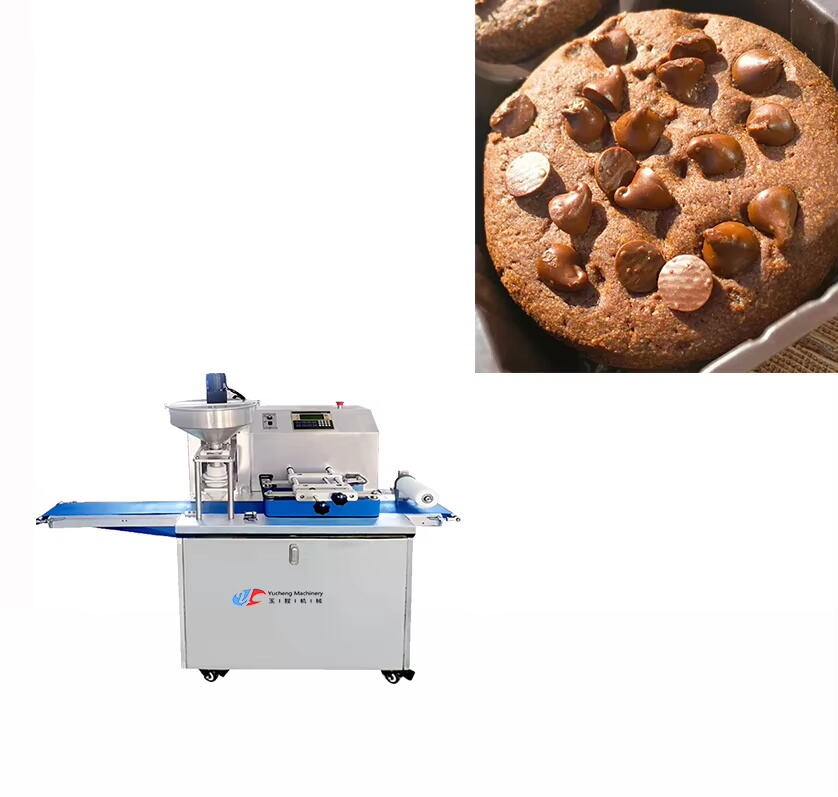Introduction to Chocolate Chip Cookie Making Machines
Why the Right Equipment Matters for Cookie Production
Selecting the appropriate equipment is crucial for enhancing the efficiency and quality of cookie production. It allows businesses to maintain consistency and scale operations effectively. Chocolate chip cookie making machines, for instance, reduce labor costs and minimize production errors by automating processes that would otherwise require manual effort. An effective production line ensures uniformity in each batch, catering to consumer expectations for consistent taste and texture.
Studies indicate that the implementation of specialized machinery can increase production efficiency by over 30%, showcasing significant advancements in operational capabilities. The integration of automated technologies streamlines the production process, reducing human intervention and the associated errors. This efficiency further translates into reduced costs, allowing businesses to allocate resources to other areas of growth and innovation. As the demand for high-quality cookies continues to grow, investing in the right equipment becomes increasingly essential for staying competitive in the market.
Overview of Modern Cookie Manufacturing Technology
Modern cookie manufacturing technology encompasses an array of advanced machines that optimize the production process. These technologies include sophisticated mixing machines, automated systems, and precision controls that ensure each stage of production is carried out to perfection. Utilizing such technology enables bakers to consistently produce cookies with the desired texture and flavor profiles.
Emerging trends in the industry are increasingly integrating robotics and smart technology to enhance efficiency and product quality. This movement towards automation not only improves production rates but also allows for real-time quality checks, ensuring that only the best cookies reach the consumer. Industry reports highlight that businesses adopting these cutting-edge technologies report substantial improvements in both output and the overall quality of their Products. By staying abreast of technological advancements, companies can further streamline operations and meet evolving consumer demands with greater agility.
Automatic Dough Mixing and Portioning Systems
Advanced Mixing Technology for Consistent Dough Quality
Advanced mixing technology is essential for producing high-quality cookies, offering precise control over kneading and blending to ensure uniform dough consistency. Automated mixing systems minimize human errors, leading to fewer defective batches and better product reliability. By maintaining consistent dough quality, bakeries can reduce waste production by approximately 15%, ultimately optimizing resource use and improving profitability. This precision in dough preparation not only enhances the end product but also supports the efficient scaling of production operations.
Portion Control Mechanisms for Uniform Cookie Sizes
Portion control mechanisms play a crucial role in producing cookies of uniform size, satisfying consumer preferences for consistency and aiding in brand integrity. Implementing advanced portion control technologies helps minimize ingredient waste, thereby increasing profitability. Industry standards emphasize the importance of uniform cookie sizes, as surveys indicate consumers favor products that appear consistent in look and feel. By ensuring each cookie is the same size, businesses can meet consumer expectations and sustain brand reputation in competitive markets.
Precision Baking Time and Temperature Control
Adjustable Settings for Perfect Baking Results
Precision in baking time and temperature settings is key to achieving perfect cookies every time. With advanced baking technology, operators can finely tune both factors to cater to specific batch requirements, ensuring that each cookie reaches the desired level of doneness without the risk of being overbaked or underbaked. Regularly calibrating baking equipment enhances flavor and texture consistency, which not only boosts consumer satisfaction but also reinforces your brand's reputation for quality. Statistical findings support that meticulous control over baking conditions can cut down errors, like overbaking or underbaking, by more than 25%, making it an indispensable aspect of quality assurance.
How Temperature Stability Ensures Evenly Baked Cookies
Maintaining a stable temperature throughout the baking process is essential for consistently baked cookies. This stability prevents issues such as undercooked centers or uneven textures, which can affect the taste and quality of the final product. Advanced ovens with features designed for precise temperature regulation help sustain an optimal environment, ensuring each cookie bakes evenly. According to experts, such stability in baking conditions significantly improves product uniformity and consumer satisfaction rates, establishing a higher standard in production quality.
By integrating precision baking equipment with adjustable settings and temperature stability, businesses can ensure each batch of cookies meets high-quality standards. This attention to detail not only optimizes resource use but also enhances overall consumer experience, making it a vital component of any successful baking operation.
Customizable Cookie Shaping and Size Options
Interchangeable Molds for Versatile Cookie Designs
Interchangeable molds are revolutionizing cookie production by allowing manufacturers to offer a wide range of cookie shapes and designs. This versatility caters to diverse consumer preferences, enabling brands to differentiate themselves in a competitive market. For instance, offering seasonal shapes or exclusive designs can enhance a brand's unique selling proposition. According to market research, brands that provide unique cookie shapes can experience a sales boost of approximately 20%, underlining the importance of variety in consumer interest and engagement. By integrating interchangeable molds into production, companies can not only appeal to a broader audience but also maintain a flexible and innovative product lineup.
Adapting to Market Trends with Size Customization
Size customization is a crucial feature for businesses aiming to stay responsive to market trends and consumer demands. It enables manufacturers to adapt to preferences for larger or smaller cookies, which can vary based on customer needs and promotional events. Flexible production systems that support size variations allow businesses to meet seasonal demands and special promotions without experiencing significant downtime. Market analyses highlight that companies adept at adapting their product sizes according to trends often maintain a competitive edge. Such adaptability ensures that brands can effectively align with consumer demands, ultimately fostering sustained customer satisfaction and loyalty.
High-Speed Production Capacity for Scalability
Maximizing Output with Industrial-Grade Machinery
Industrial-grade cookie-making machines are essential for optimizing production rates and scalability in today's competitive market. These machines are engineered for high-speed operations, enabling businesses to meet escalating demands without sacrificing quality. By transitioning to high-speed cookie production, companies can increase efficiency by approximately 40%, creating significant growth opportunities. Access to machinery capable of such performance is crucial for businesses aiming to expand their market presence while maintaining a constant supply of their products.
Balancing Speed and Quality in Large Batches
Striking the right balance between speed and quality is vital in high-volume cookie production to ensure consistent product excellence. Technologies that provide high-speed operations without compromising the quality of each batch are essential. Implementing quality checkpoints within the production process is one strategy supported by experts. Such measures ensure meticulous oversight, minimizing rework, reducing waste, and maintaining product standards during high-output periods. A well-executed balance between speed and quality not only enhances overall product satisfaction but also fortifies a brand's reputation in crowded markets.
Enhanced Efficiency and Quality Assurance Features
Reducing Labor Costs Through Automation
Automation plays a pivotal role in reducing labor costs and enhancing efficiency in cookie production. By minimizing manual intervention, businesses can focus on optimizing production processes and boosting output rates. Investing in automation technology can lead to labor cost reductions of 20-30%, translating into improved profit margins. This aligns with data from numerous financial reports, showcasing companies that leverage automation enjoy faster returns on their investments.
Built-in Quality Checks for Consistent Product Standards
Integrating built-in quality checks ensures cookie production aligns with specified standards consistently. Automated systems are adept at identifying deviations in product quality before packaging, effectively preventing potential customer dissatisfaction. Statistics reveal that the inclusion of quality checks can reduce product defects by up to 15%, significantly reinforcing brand reliability. This integration is crucial for maintaining consistent standards, thereby protecting the brand's reputation and ensuring customer satisfaction.
FAQ Section
What are the benefits of using chocolate chip cookie making machines?
These machines enhance production efficiency by reducing labor costs, minimizing errors, and ensuring consistency in cookie batches, leading to improved quality and profitability.
How does modern cookie manufacturing technology work?
It involves using advanced machinery and automatic systems that optimize mixing, portioning, and baking processes to consistently achieve desired cookie textures and flavors.
Why is precision baking important?
Precision baking ensures each cookie is baked perfectly, enhancing its taste and texture while maintaining quality and preventing issues like underbaked or overbaked products.
Can interchangeable molds affect sales?
Yes, offering unique cookie shapes via interchangeable molds can boost sales by appealing to diverse consumer preferences and enhancing a brand's competitive edge.
How does automation reduce labor costs?
Automation reduces the need for manual intervention, leading to faster production rates and lower labor costs, subsequently improving profit margins.
Table of Contents
- Introduction to Chocolate Chip Cookie Making Machines
- Automatic Dough Mixing and Portioning Systems
- Precision Baking Time and Temperature Control
- Customizable Cookie Shaping and Size Options
- High-Speed Production Capacity for Scalability
- Enhanced Efficiency and Quality Assurance Features
- FAQ Section






